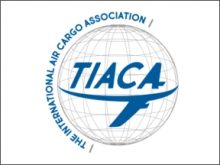 TIACA, together with Pharma.Aero released a special report for air cargo, pharmaceuticals and life sciences professionals detailing the requirements and airfreight preparedness for COVID-19 vaccines transportation. The Sunrays project report shows that 46 per cent of air cargo industry stakeholders, including airlines, freight forwarders, ground handlers, airport operators and IT solution providers, now feel well prepared for the transportation of COVID-19 vaccines, a significant increase compared to only 28 per cent feeling ready two months ago. Although the improvement is seen across the whole industry, ground handlers, who were the least prepared in September, reported the strongest jump in preparedness.
TIACA, together with Pharma.Aero released a special report for air cargo, pharmaceuticals and life sciences professionals detailing the requirements and airfreight preparedness for COVID-19 vaccines transportation. The Sunrays project report shows that 46 per cent of air cargo industry stakeholders, including airlines, freight forwarders, ground handlers, airport operators and IT solution providers, now feel well prepared for the transportation of COVID-19 vaccines, a significant increase compared to only 28 per cent feeling ready two months ago. Although the improvement is seen across the whole industry, ground handlers, who were the least prepared in September, reported the strongest jump in preparedness.
“Industry has clearly stepped up its efforts to get ready for the largest logistics effort ever seen and with 79% feeling more prepared than 3 months ago, we applaud the readiness progress the air cargo community has made,” stated Nathan De Valck, Chairman of Pharma.Aero’s Board of Directors and member of the Sunrays project. “It is very encouraging to see that the majority of our industry has established working relationships with vaccine manufacturers, dedicated teams in place and collaborates with their supply chain partners to handle the logistics of COVID-19 vaccines.”
The report also examines currently known requirements for COVID-19 vaccine logistics for the front runner manufacturers such as AstraZeneca and University of Oxford, Pfizer and BioNTech, Moderna, GSK and Sanofi, J&J, as well as the procurement and logistics strategies by individual countries and international bodies, like the EU and COVAX, and locations of vaccine trials and production.
Areas of Priority
“Although the air cargo industry has scaled up its capabilities, collaboration and readiness in the past couple of months, and COVID-19 vaccines are getting approved for wide distribution, we still live in a world with a lot of unknowns. As new vaccine requirements, purchase deals and regulatory approvals are announced everyday air cargo needs to work together to be agile enough to deliver vaccines safely at scale,” said Emir Pineda, Member of TIACA’s Board of Directors.
Air cargo players need to continue working together in full transparency to ensure integrated, fast, secure and reliable delivery of vaccines, concretely:
Strengthening industry collaboration
Vaccine manufacturers need to share information needed by all their logistics providers as early as possible to allow them to make needed investment in time.
Air cargo players should ensure their sub-contractors and supply chain partners receive the right level of information as early as possible.
Industry needs to adopt a local air cargo community approach to strengthen collaboration at local levels.
Ensuring security
Security and cyber-security measures need to be put in place to avoid theft and counterfeit.
Ramping-up capabilities
Dry ice, active containers, trained staff, and cold chain space availability should be secured early.
Infrastructure investment decisions should be made as early as possible.
Improving visibility
Each air cargo stakeholder should map its existing capabilities at each location and make this information available, using information sharing platforms like the IATA ONE Source, Validaide or others.
The use of tracking and monitoring devices is encouraged and the approval processes for their safe use in-flight needs to start as soon as possible.
The rollout of digital solutions and data sharing platforms should be accelerated.
Removing barriers
Governments, customs authorities, and border agencies should be ready to facilitate and expedite all COVID-19-related goods.
International organizations, NGOs and donors should support cool chain capacity building efforts in least developed countries to ensure no one is left behind in the upcoming global immunization campaign.
Breaking News
- BLR Cargo records 7.1% rise in cargo throughput in FY’24
- New FedEx Import Tool to Enhance Efficiency of Import Process for Indian biz
- Etihad Cargo launches Cool Dollies to enhance cold chain ops
- WiseCargo from Hans Infomatic powers India’s First Greenfield AFS
- ‘Changing trade policies can influence global supply chains’
- ‘Need to focus on capacity constraints & last-mile connectivity’
- DHL Express join forces with Komatsu to invest 1 million dollar in sustainable ops
- Vietjet Air Cargo, Teleport deepen partnership with exclusive commercial rights on first key lane
- ‘Adopting sustainable multimodal logistics solutions crucial’
- DACHSER acquires food logistics provider Brummer
- Demand for industrial & warehousing spaces up 23% in Jan-Mar: Report
 Cargo Breaking News
Cargo Breaking News


